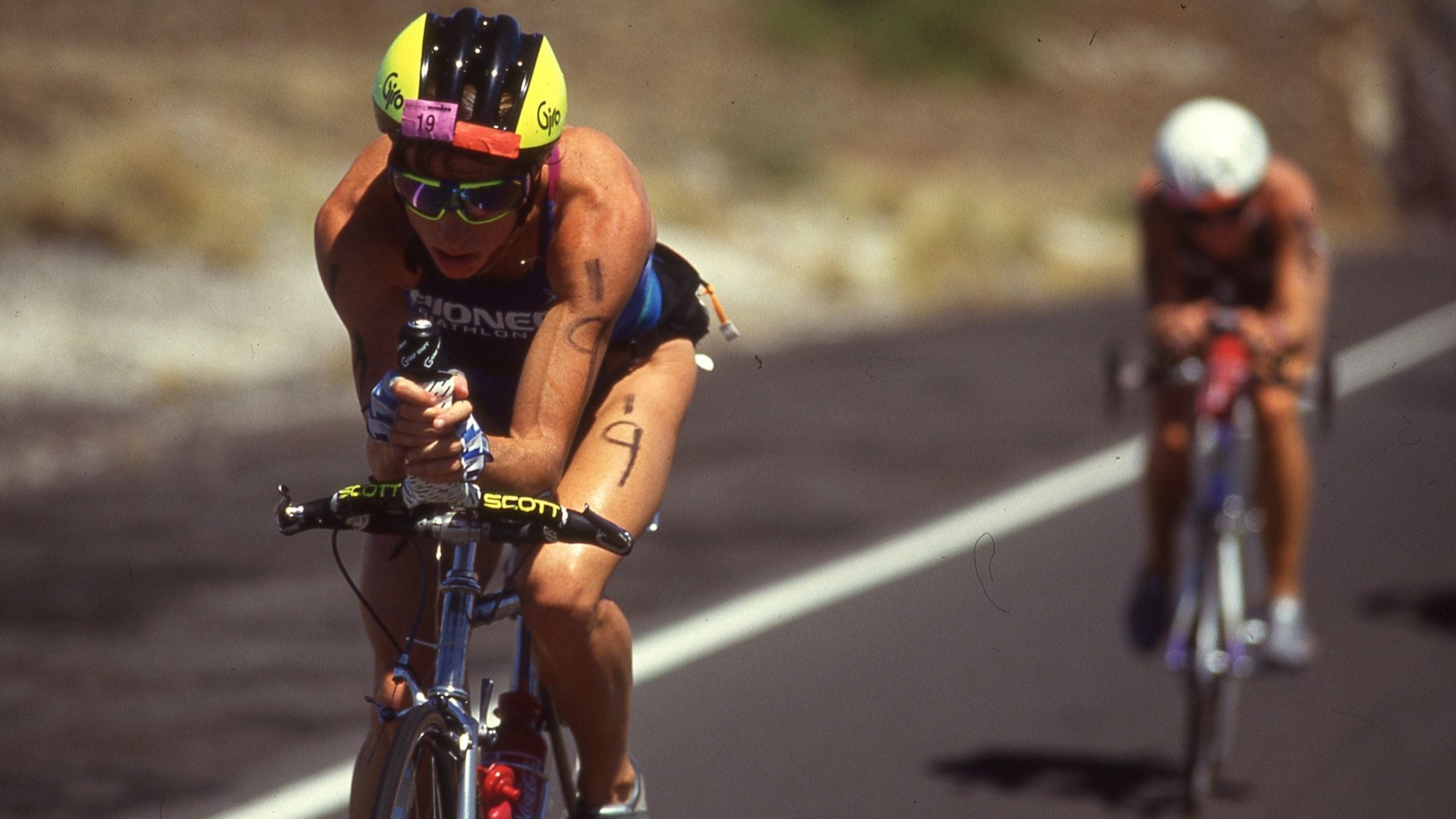Recalled: Erin Baker’s Greatest Race

(Photo: Lois Schwartz)
Last week, Triathlete unveiled its 16 Greatest Triathletes of All Time—a list carefully culled together from factors including consistency, domination, competition, and versatility, among others. One of those 16? Erin Baker, a woman whom Ironman hall-of-famer and triathlon commentator Bob Babbitt called “one of the most talented women to ever do a triathlon.” While Baker, of New Zealand, won the Ironman world championships in 1987 and 1990, it was another race where she showcased her absolute dominance: The 1990 Ironman Canada, held in Penticton, British Columbia. Not only did Baker beat “Queen of Kona” Paula Newby-Fraser by over 15 minutes, but she set a course record on the run, posting a 2:47:47 split in the marathon. Here’s more about how that race went down—and how it helped solidify Baker as one of triathlon’s greats.
Prior to the fifth annual Ironman Canada in Penticton, the expected duel between stars Paula Newby-Fraser and Erin Baker was hyped as the “matchup of the year” like a meet-up among boxing heavyweights in the ring. In one corner, there was the 28-year-old Newby-Fraser, a South African competing for Zimbabwe who already had three Ironman World Championships to her name (and would go on to win five more). In the other: Baker, 29, a fleet-footed Kiwi who had won around 90% of the races she had entered since bursting on to the scene as a 23-year-old, including a world championship in Kona in 1987.
Newby-Fraser had already lost to Baker in previous races, but she came to Canada that summer confident and ready to claim victory. “Every time I’m out to race, I’m out to win,” she said before the race.
Newby-Fraser didn’t waste a second going after that win—third out of the water, she shot to the front on the bike, leaving the rest of the women’s field, including Baker, several minutes behind in her wake. By the time she’d traversed the 112-mile single-loop course, the South African had amassed an 11-minute lead and shaved 18 minutes off of the Ironman Canada bike course record with her 5 hour, 32 minute split.
But the race, of course, was far from over.
After making her way through the bike-to-run transition, Baker—laser-focused and stone-faced behind large sunglasses, her closely-cropped hair tucked under a visor—took off on the run course, flashing the steady swiftness of the elite runner she had proven herself over and over to be. In fact, just a year prior, Baker opted out of the Ironman World Championships (which Newby-Fraser won) to focus on strictly running, saying she was a “little bored” with triathlon. She finished third at the 1989 Pittsburgh Marathon in 2:36:57, and later broke Joan Benoit Samuelson’s course record at the Bix seven-mile road race in Iowa (36:35, a mark that stood for five years and remains among the top-10 fastest finishes of the historic event). She even set her sights on a 1992 Olympic berth in the marathon or the 5K or 10K on the track. But ultimately, triathlon drew Baker back in.
It wasn’t as if Baker had lost any of that impressive run fitness, though, as she transitioned back to multisport full-time. So it wasn’t much of a surprise to see her quickly take chunks of time out of Newby-Fraser’s lead in Penticton. But would 11 minutes be insurmountable? As Newby-Fraser began to slow, showing obvious physical distress on the run, the chances of a Baker move into first became more plausible.
“Given the heat and the course, Erin is either going to blow a gasket or set the marathon course record,” broadcaster Steve King purported as Baker made the pass.
That’s just what happened: Baker continued her relentless pace in the marathon, clicking off 6:25 miles to finish 26.2 miles in 2:47:47. Her total time of 9:05:28 was so dominant that it stood as a course record for 21 years, until American Mary Beth Ellis broke it in 2011. Baker, ultimately, finished 15 minutes and 38 seconds ahead of Newby-Fraser.
Baker carried that momentum to Kona, winning the 1990 World Championships over Newby-Fraser by over six minutes. The rivalry continued for a few more years, but Baker would never beat “the Queen” on the biggest stage again. She retired in 1994, with a phenomenal 104 wins out of 121 starts, including nine world titles across all distances. And she made an impact as a political activist as well, speaking out about everything from equal pay to apartheid.
Now 60, Baker reflected on her epic day in Canada during a chat with Babbitt along with her husband Scott Molina last year, admitting her plan for the race was to test out new fuel for Kona, and was not anticipating a win—or a course record. “You feel like you’re in a different place. You feel like your body can keep going and you’re loving it,” she said. “You’re pushing and pushing and it’s just easy. That was a crazy day.”